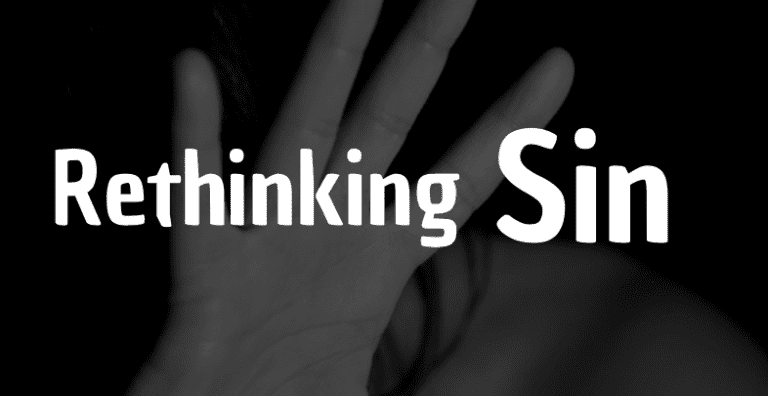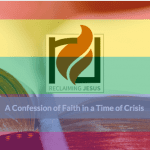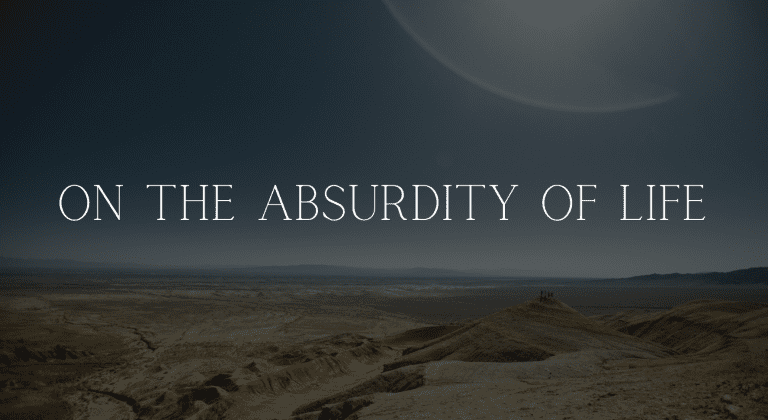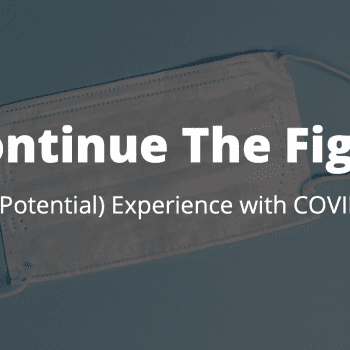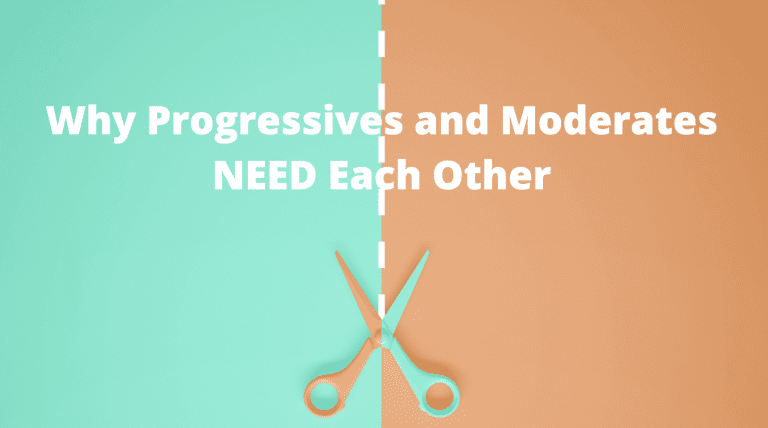Growing up, I was taught that God desired me to basically be perfect. If I thought any so-called “lustful thoughts”, if I considered any idea that was contrary to what scripture was said to think, if I was told that I had committed a “sin”. But that wasn’t even the disturbing part.
I was told that the power of sin was that it could separate me from God. That if I thought, acted, or believed in any way that was considered “sinful”, that I would be cut off from God, isolated from love and grace, and without attaining God’s forgiveness, I’d ultimately face judgement, condemnation, and hell.
This is a really screwed up way to think about humans and God, isn’t it?
Think about it. The Scriptures teach us that God is a perfect parent. Yet if all it takes is one bad thought, one improper action to cause a potential permanent, eternal separation, where God damns and condemns us, what kind of parent is that God?
To the parents reading this- would any of you ever cast aside your child for doing something wrong? Even something really wrong? And would you ever condemn and damn a child for doing something wrong?
I hope the answer is “no”.
Most of us could never imagine separating from our children or loved ones because of some wrongdoing. And yet, based on many traditional understandings of sin, this is precisely God does to us when we mess up in even the smallest way.
Now, the traditional Christian theologian would be quick to come back and say, “But Brandan, God is absolutely perfect, and in order to maintain his perfection, he cannot be in the presence of any imperfection. That’s why he demands atonement and repentance, otherwise, he cannot, by his very nature, be in the presence of anyone who has committed sin.”
Has anyone heard that from the church before?
I simply respond to that line of argument by saying, “Let me introduce you to Jesus.”
Jesus, the very incarnation of God, who chose to take on human flesh, and spend his life among the very people that the religious establishment had deemed to be unclean and sinners.
Jesus, the very one who was condemned as a partier, a drunkard, a blasphemer, an irreverent hell raiser. Yeah, that Jesus, he’s the one we worship as God.
He’s the one whom the scriptures boldly proclaimed is the “visible image of the invisible God.”
Jesus is the one who clung to people in their brokenness and sinfulness, not ran away, cast them out, or condemned them.
So, based on Jesus, I think it’s probably safe for us to assume that the traditional understanding of sin is wrong. And it’s about high time that we do some rethinking about what the Scriptures are talking about when they talk about sin.
Are you with me?
Defining Sin
So, to start, lets ask the most basic question- according to the Scriptures, what is “sin”?
The biblical word that is translated in our Bible’s as sin literally means “to miss the mark” or “to cross a boundary”. So at a very surface level, whenever you read the word “sin” in the Bible, you know that it’s speaking of the reality that all people fall short of the level of morality that we seek to live our lives by.
In the Book of James, the author describes sin in the following way: “Whoever knows what is good to do and does not do it is guilty of sin.” (James 4:17)
At a very basic level, there is no debate across Christian traditions about what sin is. It is not doing good.
But notice what James actually writes here. He says that in order to sin, one must know what is good, and willfully choose not to do it.
In other words, one cannot be guilty of sin unless they first know what they are supposed to do.
For instance, if you let a child into a room filled with candy and they begin eating it, a parent couldn’t rightfully be mad about it unless there was first a specific instruction to “Not eat the candy.”
This makes sense. If you don’t know what you’re doing is wrong, then you can’t be blamed for wrongdoing.
Even though this understanding is really logical, and clearly stated in Scripture, many Christians wouldn’t believe this. Instead, they would say that everyone is sinful, fundamentally, and everyone has transgressed God’s rules, even if they had never been told what said rules are.
If this is the case, then God is not just or fair. God is an imperfect judge. Because even our own human standards of justice can comprehend that if someone doesn’t know the law, they shouldn’t necissarily be judged for violating it.
So in order for their to be sin, there must a law or set of rules that people know of, and willfully choose to transgress.
The Bible also says that, “all people have sinned and fallen short of God’s glorious standard.”
If that’s true, then there must be some standard or law that all humans have access to. What could that be?
A Universal Standard
In the Book of Jeremiah, God says “I will put my law in their minds and write it on their hearts.”(Jeremiah 31:33)
What the Scriptures are teaching us here is that as human beings, one of our fundamental characteristics is that we share a common sense of morality- a morality that is indeed written in our minds and hearts.
If you look around the world, at every nation and culture, no matter how developed, humans have developed a common, general sense of morality. This morality isn’t based so much on prohibitions, or developing a code of things not to do, but rather, a set of values for how people should live their lives in society.
Cultural anthropologists for centuries have acknwoeldged that in virtually every culture, there is a common sense of morality, common values, like love, respect, safety, community, sacrifice, generocity, and grace. These are concepts and values that I believe God has written on the hearts of every human being.
Now, the way these are expressed by each individual culture and person may look different- what may be respectful in one culture or to one person may be disrespectful to another person in another context. But we’ll look more at this in a second.
Drawing on this concept of universal morality, or the law of God written on all of our hearts, Immanuel Kant issued a challenge to all of us saying “Live your life as though your every act were to become a universal law.”
When you think about that statement, theres power in it. But if there is power in it, it’s only because you have an inner sense of what is good, what should be valued, and what you shouldn’t do. If your every action were to become law, then you plainly know of the actions you wouldn’t want to do, because if it were to become law it would effect not only others, but yourself, negatively.
Noam Chomsky, renouned political theorist and linguist writes:
“If we adopt the principle of universality [then we are realizing that] if an action is right (or wrong) for others, it is right (or wrong) for us. Those who do not rise to the minimal moral level of applying to themselves the standards they apply to others- more stringent ones, in fact- plainly cannot be taken seriously when they speak of appropriatness of response, or of the right and wrong, good and evil.”
Every single one of us knows, deep in our being, the truth of this. Our own teacher, Jesus, echoes this same sentiment by saying:
“All laws and all of the writings of the prophets can be summed up in these two commands: Love God with all of your heart, soul, mind and strength, and love your neighbor in the same way that you love yourself.”
He echos that teaching when he speaks the famous golden rule: “Do to others what you would have them do to you.”
In other words, the law of God isn’t a set of rules, a set of do’s and donts, but rather an intuitive knowledge about what each of us need and desire for ourselves, and the call to ensure that for others.
Does that make sense?
For instance, you do not want me to go into your bank account and take your hard earned money. Therefore, you shouldn’t go into my bank account and take mine.
It’s the principle of reciprocity. Or again, as Jesus states, “What you sow, you shall also reap.”
So understanding this, it becomes clear that sin isn’t so much the violation a set of religious rules, but the violation of that intuitive sense of good and evil, right and wrong that every society in the history of humanity has seemed to have some understanding of and consensus around.
Now, I also want to point out that there is also clearly a sense that some people are more intune with the law of God written on their hearts than others.
See, sin can be conditioned. If someone is rasied in a culture or context, usually as a result of systemic oppression, where they are forced to violate their internal morality, they may very well begin to lose connection to that sense of morality.
This happens primarily to opressors and the oppressed. Those who violate morality by exploiting others for their own good, or being exploited for the good of another. This cycle of oppression often mars our sense of morality, and we become numb to a sense of conscience.
For instance, a year ago, I was in Berlin, Germany, eating lunch with a friend, when a young girl, clearly homeless, clearly a migrant from the Middle East, appeared in the restaurant. When she walked in, people verbally jeered at her, saying “Get out of here” and “Piss off!”
I watched this little girl cower in shame, but also noticed a sense of deviance in her eyes. Moments later, I saw the girl dash out of the resutraunt and a man chased her- she grabbed his wallet and had taken off.
Now, clearly, this action was morally wrong. None of us would want to have our wallet stolen. But in another sense, the systemic oppression this migrant girl faced caused her to have no choice but to steal in order to have her basic needs met.
In that sense, I don’t believe that young girl was thinking that what she was doing was “sinful”, but rather, a necessity in order to survive.
In this sense, we can have empathy for her and her actions. It’s still not “right”, be we get it, don’t we?
Speaking about this sense of becoming numb and blind to our sense of morality, Jesus says:
“If you were blind, you wouldn’t be guilty of sin. But since you claim to see, your guilt remains” (John 9:41)
See, in the Bible, sin is actually quite subjective, even though morality isn’t. Jesus says if someone is blind, and doesn’t know that they’re doing wrong, they cannot be condemned as guilty of sin.
Instead, Jesus says that only those who know to do right and willfully choose not to are guilty of sin.
In fact, Jesus teaching here is actually a double edged sword. It’s a condemnation primarily to those religious people who claim to see, as he says, but continue to do wrong.
How many Christians have been condintioned by bad theology to exclude, to be greedy, to support leaders and policies that only serve to protect their own privilege and wealth at the expense of others?
This is what Jesus is speaking about here. If someone claims to be the moral example, or morally superior, but continues to do wrong, they are the ones who are especially guilty of sin.
But to those who are unaware or have been cut off from this sense of morality by oppression and marginalization, I want to suggest, there is much more grace.
So in one very real sense, morality is objective, in that all of us know in our hearts what is good and what is bad. We all know what we’d like others to do to us, and we all understand we should extend those same actions and dispositions to others.
This seems to be the way that Jesus understands and teaches about sin and morality. We all have the capacity to do good within us, and sometimes we choose to act against that sense of morality- when we do that, we’re sinning.
The Impact of Sin
But does sin separate us from God? What is the impact and effect of sin?
We’re all probably familiar with the wiritng of Paul the Apostle when we proclaims:
“The cost of sin is death, but God’s gift is eternal life through following Jesus Christ our Lord.”
The cost of sin is death.
Wow, that sounds a bit severe doesn’t it?
How does lying to your boss about whether or not you’re actually sick or just wanting to sleep in result in “death”?
Well, as with many concepts in Scripture, death here is a metaphor and an image of what happens when we begin to allow ourselves to live out of sync with our conscience.
The famous author and theologian C.S. Lewis wrote about the effects and impact of sin in his book “The Screwtape Letters. He writes the following chilling words in that book:
“You will say that these are very small sins, and doubtless, like all young tempters, you are anxious to report your spectacular wickedness. But do remember, the only thing that matters is the extent to which you separate the man from the Enemy. It does not matter how small the sings are provided that their cumulative effect is to edge the man away from the Light and out into the Nothing. Murder is no better than cards if cards can do the trick. Indeed, the safest road to Hell is the gradual one- the gentle slope, soft underfoot, without sudden turnings, without milestones, and without signposts.”
Now again, these words appear in a work of fiction, and contain many metephors. For instance, I do not believe that hell is a literal place, and what Lewis is talking about here is not a lake of fire, but a hellish existence in this life that immorality brings. I also don’t believe that C.S. Lewis believed that having cardsis sinful.
Nonetheless, the message is potent and powerful.
One small violation of the conscience, if it goes unchecked, leads to another. Immorality snowballs, often slowly, but each time, allows us to commit greater acts of immortality.
Lewis also taught that every time we committed a sin, we were chipping away at our humanity. We we literally bringing death to ourselves, we were intentionally pulling ourselves away from the image of God, whose image we were created in, and becoming less human every time we violated our inner moral compass.
So when the scriptures say that the “cost of sin is death”, it is indeed true. Every time we allow ourselves to willfully sin, were dying to what it means to be a human. We’re progressing towards injustice, immortality, all of which, down the line, ultimately results in literal, physical, death.
The warning of scripture, then, is to be conscious of when we sin. When we violate our God-given conscience, and to be quick to right our wrong, to fix that which we’ve done wrong. Because if we don’t, and we just let it go, the problem will only grow.
Our ability to violate our conscience in broader ways grows.
No one becomes a murderer over night. No, instead, the trajectory begins with much subtler violations of our conscience. And that is a word of warning to us all. The subtle road, with not signposts or sudden turns, that’s the dangerous path.
In this sense, when we sin, we separate ourselves from God. Or at least, we increase the perception within ourselves that we are separate from God.
You see, it’s impossible to be separate from God. God is the ground of Being and is life itself. The Scriptures say that God holds all things together, and that in God we live and move and have our being. And the God revealed in Jesus isn’t one that runs from us when we do wrong, but is the father who stands, arms outstretched to his prodigal child, calling “Come home.”
However, we can certainly create the pereception that we are separated from God, through the path of shame.
The Power of Shame
What I mean is this: When a child does something wrong, and gets caught, one of the first reactions is often one of shame. They recoil and fear a sense of judgement or rejection. But for healthy parents, the reaction to a childs wrongdoing is never judgementor separation, but correction. In fact, most parents would be horrified if their child said, “I’m sorry I did [blank] wrong, are you going to disown me?!”
If separation was the result of sin, then we could safetly and surely say that God didn’t love us. No parent would ever desire to cast out their children.
But shame creates a sense of separation for those who are guilty.
Think about it, when you’re ashamed, don’t you often avoid that person whom you’ve violated. Don’t you feel less than in their presence, and anticipate rejection and judgement?
But also notice that all of that is within your own head. It’s not the objective reality.
Even when we sin, we need not be ashamed before God. This is the message of Scripture going back to the garden of eden.
Remember when Adam and Eve first sinned in the Genesis story?
After they sinned for the first time, the Scriptures say
“Then the eyes of both of them were opened, and they knew that they were naked, and felt shame.” (Genesis 3:7 NLT)
Sin resulted in shame.
And do you remember what the shame-filled Adam and Eve do next? They try to make coverings of fig leaves, and hide in the garden when they hear God coming.
Did you get that? Adam and Eve are the ones who run and hide from Godbecause they are ashamed of their actions.
They perceived a sense of shame, and they created their own sense of separation.
Do you know what happens next?
The Scriptures say that God rebukes Adam and Eve for sinning, telling them that there will be temporal consequence for their sins, and then we’re told:
“The Lord God made garmets of skin for Adam and his wife and clothed them.”
Do you see what God did? Instead of rejecting them from his embrace, instead of allowing them to hide and try to cover up their nakedness with feeble leaves, he create a permant covering for them.
God doesn’t judge them. He covers them.
And notice, for the first time in the entirety of Scripture, God covers Adam and Eve with the skin of an animal. In other words, for the first time, God makes a sacrifice, taking the life of an animal to cover the shame of Adam and Eve.
In this image, there is so much meaning. We see first, that nothing separates us from God, and that even in our shame, God desires to cover us and remove our sense of shame. We see that sins often have temporal consequences. But we also see, for the first time, that sin truly does result in death. God had to sacrifice an animal to cover the shame of Adam and Eve. This image of sacrifice due to shame is the very image that Jesus embodies as he gives his life on the cross to cover the shame of the world.
Isnt that incredible?
See, sin isn’t the major problem in scripture, but shame. In our shame, we project a sense of separation on to God, but nothing can separate us from the love of God as the Apostle Paul proclaims. Shame drives us to hide. Shame drives us to sin more.
God desires us to stand naked and unashamed before him and in the world.God desires us to stand boldly and beautifully, just as we are, reflecting God’s glory in our uniqueness and diversity. But in order for that to happen, we must avoid sinning, avoid shame, and seek to do what is good for us, for others, and for the world.
And by the way: This is why confession of sin has always been important in the Christian faith- unless we acknowledge and name that we’ve messed up, there’s no way that we can avoid doing the same thing again. Confessing sin, owning it, naming it, and acknowledging it is key to expelling shame and getting back on the right path
The message of Scripture about sin is this: Seek to do right, but when you do wrong, know that God is quick to cover you, forgive you, and resotre you. That doesn’t mean you wont face temporal, earthly consequences, but ultimately, God looks on you like a loving parent, and seeks to embrace you, heal you, and call you to a better way of living, every time that you mess up. Grace is never ending, and is meant to call you back to the path of right living every time you mess up.
This is truly a different perspective on sin than many of leanred in church contexts, isn’t it?
But as you can see, it is thuorughly Biblical, thoroughly Christ Centered, and helps each of us walk on the path of right living, modeled after Jesus, seeking to do good, make right what we’ve done wrong, and grow deeper and deeper into our true selves and our relationship to God.

